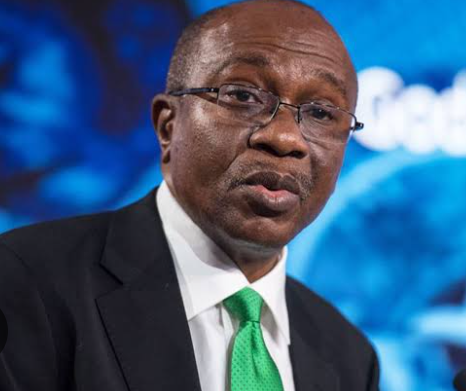
Cash, Claims, and Controversy: Witness in Emefiele Trial Admits Handing Over $400,000 With No Evidence

In a startling revelation at the Lagos Special Offences Court in Ikeja on Monday, a prosecution witness admitted to delivering $400,000 in cash to former Central Bank of Nigeria (CBN) Governor Godwin Emefiele—without documenting the transaction in any way. The confession, made under oath by John Adetola, the seventh witness in the ongoing trial, has stirred fresh controversy and cast new shadows over a case already soaked in allegations of multibillion-dollar corruption.
Adetola, who once served as executive assistant to Emefiele, took the witness stand before Justice Rahman Oshodi, where he recounted a transaction that has now become a critical piece in the EFCC’s sprawling case against the ex-governor. According to Adetola, sometime in 2018, he was instructed via WhatsApp by a man named Eric Odoh to collect the cash from a former Director of Information Technology at the CBN, John Ayoh, and deliver it to Emefiele in Lagos. The amount: $400,000 in hard currency. The method: an envelope, handed over without a receipt, record, or a single text message of confirmation.
“I did not see any need for it,” Adetola repeatedly told the court when questioned why he failed to document such a large cash transaction.
His casual admission has since sent ripples through the courtroom and beyond, raising concerns over internal practices at the apex bank during Emefiele’s tenure and leaving observers questioning the strength of the EFCC’s case, which includes 19 counts bordering on bribery, abuse of office, and corrupt demands allegedly amounting to $4.5 billion and ₦2.8 billion.
Emefiele, who appeared alongside co-defendant Henry Omoile, listened as Adetola claimed he acted solely on Odoh’s instruction, with no direct message or verbal confirmation from Emefiele himself. Under cross-examination by the embattled ex-governor’s lawyer, Olalekan Ojo (SAN), the witness confirmed he never communicated with Emefiele about the money either before or after the handover.
“In my statement to the EFCC, I did not mention any communication with the first defendant regarding the money,” Adetola told the court.
Despite the staggering figure involved, the former aide insisted that nothing about the transaction seemed unusual or worthy of a record at the time. He also stated that he was not under any prosecution himself, had no immunity agreement with the EFCC, and spent 11 days in EFCC custody without being confronted face-to-face with either Emefiele or Ayoh.
While Adetola’s testimony may appear damaging on the surface, legal experts following the proceedings are already noting glaring gaps in the prosecution’s case. Not only is there no paper trail—no receipt, no signed document, not even a digital record like a screenshot or call log—but the money trail rests solely on the memory and word of a man who admits to bypassing standard protocols.
Still, the EFCC’s lead prosecutor, Rotimi Oyedepo (SAN), sought to reinforce the credibility of Adetola’s account during re-examination. The witness maintained his story, insisting again that he “did not see any need” to document the exchange of the funds. When asked to elaborate on his role at the CBN, Adetola explained he worked directly under Emefiele, whom he described as “the head of the secretariat.”
The testimony took yet another twist when the second defendant’s counsel, Yinka Kotoye (SAN), grilled Adetola about any dealings with Henry Omoile. The witness flatly denied ever meeting or conducting any transaction with Omoile, further narrowing the scope of his relevance in the broader case.
As Justice Oshodi adjourned the matter till Tuesday for continuation of the trial, the courtroom emptied out into a buzz of murmurs and side conversations. Outside, public opinion continued to divide along familiar lines: those who see the trial as a necessary reckoning for Nigeria’s financial elite, and others who question whether it’s merely an elaborate performance lacking the hard evidence needed for conviction.
The Emefiele case has been one of Nigeria’s most high-profile financial scandals in recent history. Once hailed as a reform-minded economist steering monetary policy through turbulent waters, the former CBN governor’s fall from grace has been swift and dramatic. Following his suspension and subsequent arrest, revelations of alleged clandestine payments, offshore accounts, and political entanglements have fueled speculation and skepticism about the extent of his influence—and the rot that may have existed under his watch.
Yet, even with billions of naira and dollars allegedly exchanged behind closed doors, the success of the EFCC’s prosecution may ultimately hinge on testimonies like Adetola’s—vivid but unverifiable, and deeply reliant on memory rather than material evidence.
As the court resumes today, all eyes will remain on the witness box and the prosecution’s ability to substantiate their damning claims with something more concrete than anecdotes and assumptions. For now, what is certain is that this trial has opened a window into a murky world of shadow transactions and opaque governance at the highest levels of Nigeria’s financial system—a world where millions can move in silence, and where even a $400,000 handoff might go completely undocumented.
If justice is to be served, it will need to speak louder than whispered instructions and cash-filled envelopes.


